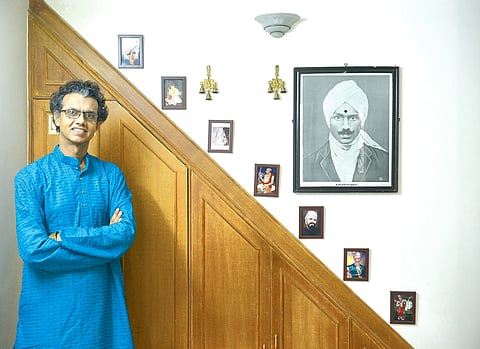

Success takes a greater measure if it is a product of a triumphant return, more so if the person’s story stands as an inspiration for others to follow.
Musician and composer Rajkumar Bharathi, who has had a journey of pathos and victory, will receive the prestigious Sangeet Natak Akademi Music for Dance Award this year.
Born as a child prodigy, he lost his voice at the pinnacle of his career. But that didn’t take away the talent he was born with, neither could it lessen his pursuit of music. In fact, his indefatigable spirit for music resulted in getting the honour.
Bharathi was born in 1958 to Venkatasubramanian and Lalita Bharati, the granddaughter of Mahakavi Subramania Bharati.
When Bharathi was about five years old, he showed glimpses of his innate musical talents. In 1968, he came under the tutelage of Valliyur Gurumurthy. In 1975, he won the Tambura Prize and bagged a major slot in the December Season of Indian Fine Arts Society. A few years later, he began his training under T V Gopalakrishnan because of his interest in Hindustani music. His interest in Thillanas, a rhythmic piece in Carnatic music, took him to veteran M Balamuralikrishna.
But his family, particularly his father, emphasised on the need of a steady income and Bharathi took up a job as an R&D engineer in a company, balancing his musical career in the evenings. In 1982, the centenary year of veteran writer and poet Subramania Bharati, something remarkable happened to him. He was approached to sing Bharatiyar’s compositions on television. “Television indeed helped me to gain reputation,” says the artist whose performance career had started picking up by then.
In 1984, he tied the knot with Santhalakshmi. The following year, his guru Gopalakrishnan brought Narayanaswamy Rao of Rama Sevamandali, Bengaluru, as a guest in a concert. The latter was so impressed with Bharathi that the next 15 years followed with a series of concerts.
Though his first film Kaladi Osai never got released, L Vaidyanathan’s Ezhavadu Manidan marked his entry into the big screen. With a playback record of 150, Bharathi had sung in Malayalam, Telugu, Kannada and Tamil films. Singing for dance was not his choice at all, but when Malathi Iyengar approached him in the year 1992, he gave it a try. This trial became his profession from 2002 onwards when he was diagnosed with dysphonia, an impairment of the vocal chords to produce sound. “The first time I felt a hinge in my vocal chords was in the middle of a concert. A series of check-ups by doctors failed to detect what was wrong until Dr Mohan Kameswaran tole me the reality,” recounts Bharathi.
“To come to terms that my voice no longer was an asset but an irreversible problem was devastating,” he shares with a bleak of regret on his face and, immediately covering it up with his warm smile, adds: “In spite of losing my voice, they believed in my musical skills and approached me to compose music for their dance productions.”
Bharathi has composed music for eminent dancers like Savita Sastry, Lakshmi Ramaswamy, Jayanthi Subramanian, Alarmel Valli, among others. He won several awards and titles, including Award of Excellence from Saila Sudha, Asthana Vidwan of Sri Datta Peetham, Mysore, Gana Kala Bharathi from the Hindu American Temple and Cultural Centre, USA and Acharya Choodamani from Sri Krishna Gana Sabha are a few of them. What if Bharathi is not happy with his music? He humbly answers, “There have not been such occasion yet. I create music that gives me happiness and satisfaction. Unless it is convincing to me, I cannot make my clients happy.”